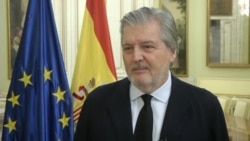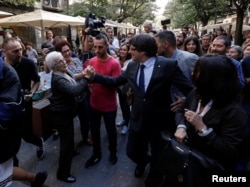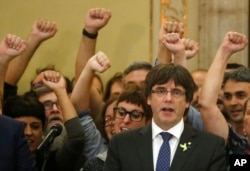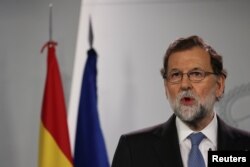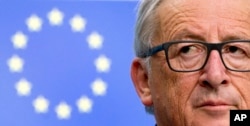Catalonia’s deposed President Carles Puigdemont vowed on Saturday to keep fighting for independence after the Spanish central government ordered him to accept his cabinet’s dismissal.
The Spanish region of Catalonia, which once enjoyed a considerable amount of autonomy, is now under the direct control of Madrid.
Spanish Prime Minister Mariano Rajoy dissolved Catalonia's parliament, just hours after the regional body voted Friday in favor of independence from Spain.
WATCH: Spanish official discusses December elections
In addition to dismissing the regional parliament, Rajoy has called for snap Catalan elections on December 21 and has stripped Catalonia's most senior police officials of their powers.
In a pre-recorded statement, Puigdemont said he would continue working to build a free country and that only the regional parliament has the authority to dismiss the Catalan government.
“Our will is to continue working to fulfill the democratic mandates and at the same time seek the maximum stability and tranquility,” he said.
Íñigo Méndez de Vigo, a spokesman for the Spanish government, said Puigdemont and all other Catalonian leaders will be eligible to run in the December election.
“We are giving the voice to the Catalans in a legal and free elections, not so-called referendum which is outside the law,” he said. “So, this is the way of telling the Catalans, if you want to vote, you have the right to vote, do it under the conditions of the law and freely.”
WATCH: Spanish official: 'Giving the voice to the Catalans'
The Catalan regional parliament voted for independence from Spain Friday, in a move that was accompanied by applause and embraces between lawmakers present, who sang the Catalan anthem.
The resolution to secede from Spain was drafted and presented by the more radical separatist factions of the regional coalition headed by Puigdemont, and it passed with 70 votes in favor, 10 against and 2 blank votes.
Friday's resolution by the Catalan regional parliament ends a period of uncertainty over Catalan independence that has prevailed since an October 1 referendum on independence that won 90 percent of the vote in a 50 percent voter turnout.
Puigdemont could face a 25-year prison sentence for sedition. The central government already has jailed two separatist leaders and is prosecuting other officials accused of using public resources to support the independence bid.
Immediately following the Spanish senate vote to impose direct rule on Catalonia, the government issued an official bulletin announcing that Puigdemont and his Vice President Oriol Junqueras had ceased to be the heads of the Catalonian regional government.
Spain’s Senate responded to Catalonia's independence move by approving the application of constitutional article 155, which officially authorizes the central government to suspend Catalan authorities and take over the region’s administration.
“The turn of events ...has left us with no recourse but the application of constitutional prerogatives to reinstitute the legal order in Catalonia,” said Spain’s senate president.
Rajoy appealed for national “calm” and called together a special cabinet meeting for later Friday.
"The government will take whatever measures are necessary. We will not allow a group of people to liquidate the country,” he told reporters.
Puigdemont, accompanied by other members of the Catalan regional government, lawmakers and hundreds of mayors, crowded onto the steps of the parliament building to address thousands of supporters gathering outside, shouting “liberty.”
In a short speech, he said, “We ourselves must now form our own structures and our own society."
Socialist opposition leader Pedro Sanchez reacted to the Catalan independence move Friday by pledging “my party’s progressive flag will never join those seeking to take our country over the abyss.”
Even regional authorities in the traditionally nationalistic Basque region have been reluctant to support the Catalan cause, despite growing relations between radical separatists in both regions.
World reaction
De Vigo said Europeans “do not want any new nationalism,” and he pointed out that no foreign nations had yet recognized an independent Catalonia.
“We know what in history nationalism has meant to Europe. So, I think it is a very positive reaction,” he said.
The United Nations spokesperson urged all sides “to seek solutions within the framework of the Spanish constitution and through established political and legal channels.”
The European Union Council President Donald Tusk, who has supported Madrid’s approach to the crisis, said on Twitter he hoped “the Spanish government favors force of argument, not argument of force.”
European Union President Jean-Claude Juncker echoed the sentiment, saying “there isn't room in Europe for other fractures or other cracks. We've had enough of those.”
NATO, of which Spain is a member, said in a statement, “The Catalonia issue is a domestic matter which should be resolved within Spain’s constitutional order.”
Madrid’s efforts to keep the country united also have the continued support of the U.S. government. U.S. State Department spokeswoman Heather Nauert said in a statement, “… the United States supports the Spanish government’s constitutional measures to keep Spain strong and united.”
Russian involvement
Some international support for Catalan independence, however, seems to be coming from Russia, which is giving some recognition to Catalan separatists as reciprocal action for past U.S. and European backing to breakaway former Soviet republics and the controversial independence of Kosovo.
“By backing the independence of Kosovo, formed and prosperous countries such as Spain put at risk their own fragile stability,” Russian President Vladimir Putin said last week at an international forum in Sochi.
"It's undeniable that Putin is interested in the destabilization and balkanization of Spain," a senior Spanish diplomat told VOA, asking that his name not be used.
The de facto foreign minister of the Russian supported breakaway state of South Osetia, Dimitri Medoev, who is reported to be close to the Kremlin, visited Catalonia this week to set up an “interests office” in Barcelona to promote “bilateral relations in humanitarian and cultural issues."
South Osetia pledged support for the “sovereignty of Catalonia” following the October 1 referendum.
Rogue states such as Venezuela and North Korea also have expressed support for Catalonian secessionism.
Martin Arostegui in Barcelona contributed to this report.







